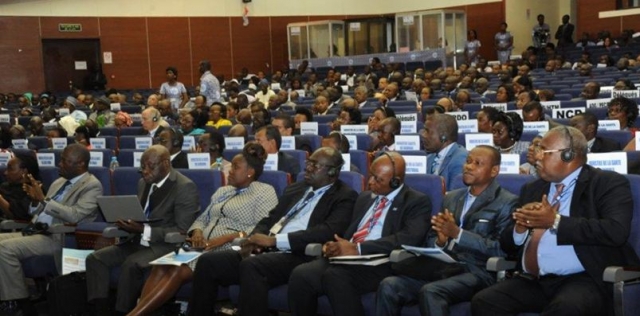Ministers of Health in the African Region endorse WHO’s commitment to transformative change
 N’Djamena, 24 November 2015 – Today, delegates at the 65thSession of the World Health Organization (WHO) Regional Committee for Africa endorsed the WHO Regional Office for Africa (WHO AFRO)’s Transformation Agenda, a vision and strategy that will ensure the Organization is better equipped to be the primary leader in promoting health in Africa.
N’Djamena, 24 November 2015 – Today, delegates at the 65thSession of the World Health Organization (WHO) Regional Committee for Africa endorsed the WHO Regional Office for Africa (WHO AFRO)’s Transformation Agenda, a vision and strategy that will ensure the Organization is better equipped to be the primary leader in promoting health in Africa.
The Transformation Agenda comes as a follow-up to the pledge by Dr Matshidiso Moeti, WHO Regional Director for Africa, to Health Ministers at the Regional Committee (RC64) in Benin in November 2014, to change how the WHO Secretariat does business and to become a more proactive, transparent and appropriately-resourced organization.
“When nominated as WHO Regional Director for Africa, I committed myself to transforming the WHO African Region into a responsive and results-driven Organization. The endorsement of AFRO’s Transformation Agenda by local health ministers is a key step in improving WHO’s effectiveness, timeliness and efficiency in improving the health and well-being of people living across the region,” said Dr Matshidiso Moeti, WHO Regional Director for Africa.
The Transformation Agenda was developed through a consultative process and it serves as a platform to implement WHO reforms in the African Region. It is focussed on four areas:
- Pro-results values: Promoting and instilling shared values such as excellence, integrity, team work, accountability, integrity, equity, innovation and openness and creating a working environment that inspires and demands good performance and fairness with a focus on results.
- Smart technical focus: Focussing the technical work of the WHO Secretariat on priorities that reflect the most important health problems in the Region, and ensuring that evidence-based actions are employed when and where they are needed most.
- Responsive strategic operations: Ensuring that the WHO Secretariat’s operations in support of Member States are more effective, timely, efficient and accountable.
- Effective communication and partnerships: Enhancing strategic partnerships and more effectively articulating and communicating WHO’s contribution to health development across the Region.
These focus areas are consistent with the governance, programmatic and management reforms of WHO at the global level, and complement the Regional Director’s focus on strengthening health systems and expanding universal health coverage.
Implementation of the Transformation Agenda is well underway. Since assuming office, the first programmatic priority has been to bring the Ebola virus disease outbreak in West Africa to an end and to strengthen the Region’s preparedness and capacity to effectively respond to disease outbreaks and emergencies. Other actions carried out include:
- The strengthening of the capacity of the Regional office with the creation of the Health Security and Emergency Cluster that coordinates outbreak, preparedness, emergencies and humanitarian responses.
- The WHO Secretariat has supported the three affected countries to develop post Ebola recovery plans which include building resilient health systems. The plans have been used to mobilise resources resulting in funding pledges of USD 5 Billion. As a result of concerted efforts by the affected countries, WHO and partners, the Ebola virus disease in West Africa is almost at its end.
- The Region has reached a major milestone it its efforts to eradicate polio. On 25 November, Nigeria which was the Region’s only remaining polio endemic country was removed from the list of polio endemic countries. The country’s last wild polio virus case was reported in July 2014.
- An Accountability and Internal Control Project has been initiated to ensure the rational and efficient use of resources, deliver results and combat fraud. The Compliance Unit has been restructured and has adopted a new and integrated way of working to enable prevention of fraud and to facilitate the imposition of sanctions where necessary. An Audit, Compliance and Risk Committee has been established to monitor the adequacy and effectiveness of internal controls
- Key Performance Indicators have been developed and are being used to measure the performance of staff objectively.
- Recruitment process has been streamlined to attract highly skilled and dedicated staff, able to realize its potential through a culture of cooperation, teamwork and shared responsibility.
“Thanks to the commitment of our staff at AFRO and the contribution of development partners in Africa and around the world, we are making significant progress toward improving health in the African Region. I am confident that our collective efforts, drawing on our respective strengths and resources, will go a long way in addressing the biggest and most complex health challenges facing our region,” said Dr Moeti.
Delegates expressed support for the launch of the Transformation Agenda and acknowledged the work that has already been done this year. With the recent adoption of the Sustainable Development Goals and the end of the Ebola virus disease outbreak on the horizon, there was consensus that the implementation of the Transformation Agenda will enhance WHO’s work and help improve health in Africa.
________________________________________________
For more information, please contact:
Dr Joseph Cabore, Director for Programme Management, Tel: +47 24139386, Email: caborej [at] who.int (caborej[at]who[dot]int)
Collins Boakye-Agyemang, Regional Communications Adviser, Tel: + 242 06 520 6565, Email: boakyeagyemangc [at] who.int (boakyeagyemangc[at]who[dot]int)
Jonas Naissem, Communications Officer in Chad, Tel: +235 52 3805, Email: naissemj [at] who.int (naissemj[at]who[dot]int)


